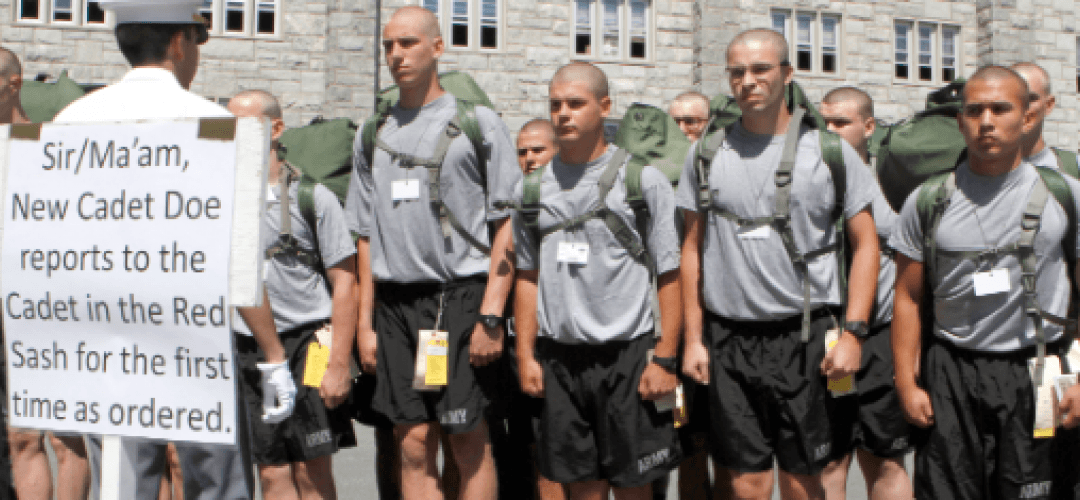Photo by Mike Strasser/Pointer View, www.army.mil
By Paul Culp, MA (Oxon.), CFT, GCDF, CCSP
Applying for admission to the service academies can be a character-builder. Or perhaps, to borrow from Heywood Hale Broun’s oft-quoted remark about sports, applying for the academies doesn’t build character but rather reveals it. The Air Force Academy asserts that applying there is “considerably more involved than applying to a typical college or university and “requires focus and determination.” West Point provides a succinct warning:
![]()
Well, not unless you don’t know how to position end-punctuation within quotes in American English, in which case you have little to fear from West Point. The Merchant Marine Academy describes application as “a length process.” So even as Uncle Sam’s command of English deteriorates, high school students who aspire to an academy education need to brace themselves for a protracted and complex procedure commencing in winter and spring of junior year. It’s essential to check the various academy websites for deadlines and timetables, which vary somewhat across the institutions. Eligibility requirements may also differ slightly from one academy to another, so a careful reading of standards is important. With application to multiple academies being common, probably the norm, the opportunities for confusion are considerable.
In all cases, the first step is an online application that provides the sort of details one might expect. Some of the academies also require applicants to contact a local or regional field representative who will provide guidance and oversight along the way. For supporting documents, the applicant must round up the usual suspects: ACT or SAT scores, transcripts, documentation of class rank, and letters of reference. But of course there’s much, much more:
With the exception of the Coast Guard Academy, which has an open admissions process with no geographic component, academy appointments require nomination by the applicant’s U.S. senator or representative in Congress, or by the vice president, who is allowed a maximum of five nominees per year each at West Point, Annapolis, and the Air Force Academy. (In practice the vice president typically has only one or two vacancies at each academy to work with in a given year, with thousands of applicants from each institution. The service academies rank the applicants for him so as to make the task reasonably manageable.) Each congressional office is on its own for deciding how it evaluates candidates.
The maximum of nominees per senator or congressman per year depends partly on how many of his or her previous nominees are still in attendance at particular academies. At any given time, a lawmaker may have up to five constituents each at West Point, Annapolis, and the Air Force Academy. The Merchant Marine Academy has a somewhat different system:
Candidates are appointed competitively by the Academy for the vacancies allocated to their state or geographical area. Each state has an assigned number of appointees proportionate to its representation in Congress. After the Academy has selected its principal appointees, the remaining qualified candidates will be designated as alternates to be appointed in order of merit should openings occur within their states.
At each of the service academies other than Coast Guard, a senator or representative typically is allowed to nominate ten candidates for each open slot each year.
The nomination process requires an interview and is not renewable from year to year in the case of an applicant whose original plans encounter delay. Nominations are time-consuming, and applicants should begin the undertaking in the spring of junior year, unless the academy indicates otherwise.
Academy applicants must also pass a medical examination and a physical fitness assessment, and the admission quest is capped off by an interview, typically conducted by an alumnus or by a parent of a cadet or midshipman. As West Point puts it, “Much like the Congressional nomination interview, it should be treated as an important formal interview and one of the many hurdles you will need to successfully clear before obtaining an appointment. You are sending many verbal and non-verbal messages to the interviewers.” (For a thorough treatment of related topics, see Cleaning Up Well: Appearance, Speech, and Demeanor at College Interview Time, June 7, 2018.)
http://tce.local/2018/06/07/cleaning-up-well-appearance-speech-and-demeanor-at-college-interview-time/
The academies differ regarding visits by applicants. Some allow overnight or day visits by individuals, while others emphasize events for large numbers of applicants.
Students considering the Merchant Marine Academy should be aware that financial arrangements there differ markedly from those of the other academies. The federal government covers tuition and fees, room and board, uniforms, and books, but an assortment of other supplies and services are the responsibility of the individual. (Though midshipmen do not receive the monthly stipend that the other academies provide, they are paid while training at sea.) Applicants for admission there may obtain financial aid by conventional means, as they would for other colleges and universities.
For information on the competitiveness of admissions at the different academies, and the differences in their academic and extracurricular opportunities, please see our article, The Five Service Academies: A Brief Overview, September 25, 2018. We also recommend our interview with a recent academy graduate, The Ensign’s Tale, June 10, 2018.
http://tce.local/2018/09/25/the-five-service-academies-a-brief-overview/
http://tce.local/2018/07/10/the-ensigns-tale-we-talk-to-a-recent-academy-graduate/
The Coaching Educator is proud of our clients who have secured academy appointments, and we take great satisfaction in having assisted them with a process that can be quite an ordeal. With a decade of experience, we know how to keep you on task, on topic, and on schedule throughout. To learn more about our approach to college admissions and financial aid, please watch our free webinars, sign up for our four-week College App Boot Camp, consider our comprehensive Ultimate Programs, look at our special services for athletes and performing-arts students, and book a consultation to learn more about what we can do for you and how we do it. Keep reading this blog, and look for us on social media as we keep our clients and admirers advised of new developments in our effort to help students get into and succeed at the right college.
Paul Culp is certified as a global career development facilitator and writes about college admissions, college costs, financial aid, and college life in general for The Coaching Educator team. A former journalist and corporate ghostwriter who now operates Shenandoah Proofreading, Editing & Composition Services (SPECS), he has also been a humanities teacher at all levels from university down to sixth grade. Paul has degrees from Oxford University, Jacksonville State University, and Samford University, and also is certified as a fitness trainer.
References and Recommended Reading About College Admissions
Culp, Paul. “Cleaning Up Well: Appearance, Speech, and Demeanor at College Interview Time,” The Coaching Educator, 7 June 2018, http://tce.local/2018/06/07/cleaning-up-well-appearance-speech-and-demeanor-at-college-interview-time/
Culp, Paul. “The Ensign’s Tale: We Talk to a Recent Academy Graduate,” The Coaching Educator, 10 July 2018, http://tce.local/2018/07/10/the-ensigns-tale-we-talk-to-a-recent-academy-graduate/
Culp, Paul. “The Five Service Academies: A Brief Overview,” The Coaching Educator, 25 September 2018, http://tce.local/2018/09/25/the-five-service-academies-a-brief-overview/
Culp, Paul. “ROTC Scholarships: Uncle Sam Wants You, and He Has Deep Pockets,” The Coaching Educator, 30 August 2018, http://tce.local/2018/08/30/rotc-scholarships-uncle-sam-wants-you-and-he-has-deep-pockets/
Shesgreen, Deirdre. “How lawmakers dole out military academy nominations, The Cincinnati Inquirer, 15 September 2014. https://www.cincinnati.com/story/news/politics/2014/09/15/cincinnati-lawmakers-military-academy-nominations/15676345/
The U.S. Air Force Academy. https://www.academyadmissions.com/admissions/
The U.S. Coast Guard Academy. https://www.uscga.edu/admissions/
The U.S. Merchant Marine Academy. https://www.usmma.edu/admissions
The U.S. Military Academy. https://www.usma.edu/admissions
The U.S. Naval Academy. https://www.usna.edu/Admissions/

